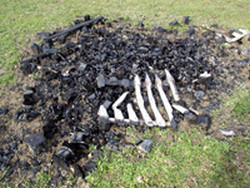Improving salty soils for sequestration
Soil degradation and salinisation represent two of the greatest threats facing agricultural areas, with 7 % of the earth made up of land contaminated with saline soil. Salt toxicity is one of the main factors limiting crop production in saline soils around the world. The mutually beneficial relationship (described as 'symbiotic') between arbuscular mycorrhizal (AM) fungi and plants has been shown to improve soil stability. This includes such highly saline soils as those found in salt marshes. The 'Managing AM fungi for enhancing C sequester in an agroecosystem affected by salinity' (MYCOCARBOSE) project sought to improve saline soil. The aim was to develop ways of stabilising degraded salt-affected soils and increase carbon sequestration. Researchers focused on areas where high levels of toxic soluble salts and scarcity of organic matter were the main limiting factors to crops' development and growth. Charcoal used for improving soil fertility is referred to as biochar. Its addition is also believed to improve the sequestration of carbon in soil. MYCOCARBOSE used lettuce for an innovative greenhouse experiment to investigate whether biochar reduces salt stress in plants and whether it interacts with AM fungi. The experiment showed that the addition of biochar and inoculation with AM fungi can have a positive effect and reduce salt stress. Phosphorus was the main mineral nutrient that showed an increase in plant content following the addition of biochar. This was also the case following inoculation with AM fungi, where improved phosphorus nutrition was the most important factor leading to increased plant growth. Results indicate that both biochar and AM fungi have a synergistic effect on plant growth under normal conditions. Although both can reduce salt stress, biochar is particularly effective due to its ability to absorb ions and thereby reduce electrical conductivity. As biochar is already recommended for use in semi-arid soils its potential for use in saline soils should also be exploited.







